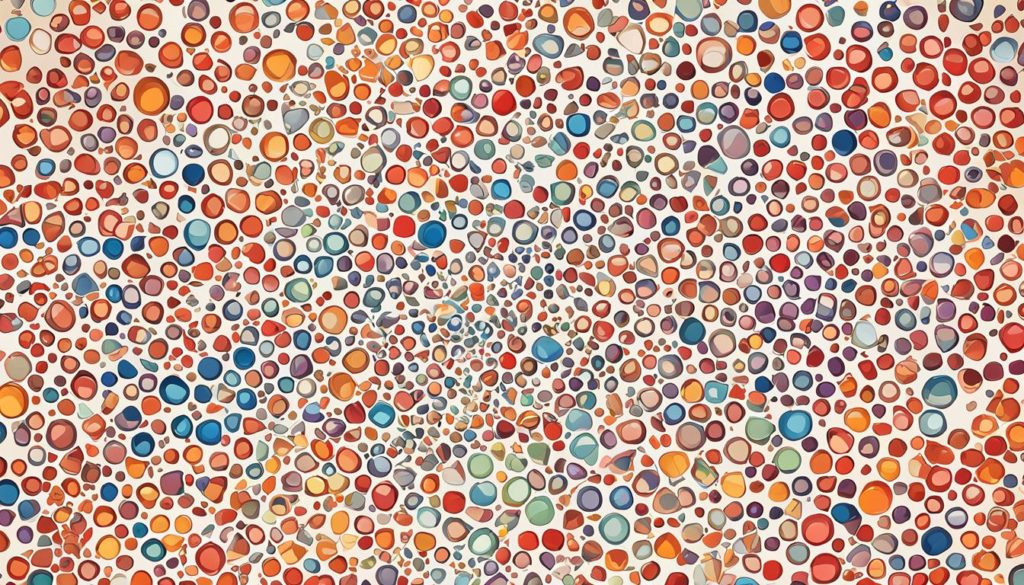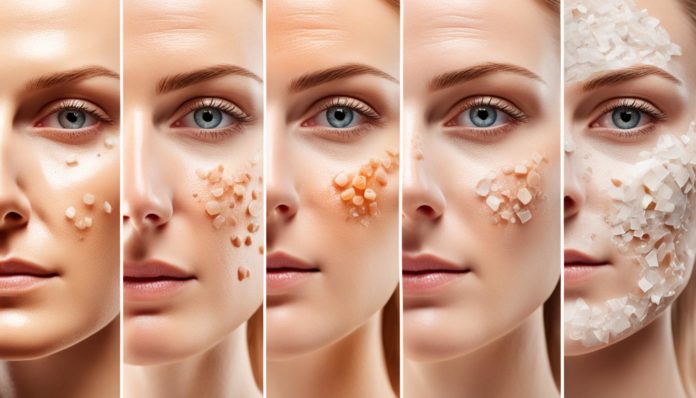Did you know about 85% of people from 12 to 24 get some acne? This shows how common skin breakouts are. It shows why it’s key to know terms and conditions about acne. Welcome to the acne dictionary: your go-to guide for understanding skin conditions.
An acne dictionary is crucial for anyone wanting to know more about skincare. It lists and explains different terms about skin breakouts. Knowing these terms can really help manage and treat your skin, whether you have a lot of acne or just occasional bumps.
Key Takeaways
- An acne dictionary breaks down complex dermatology terms related to skin breakouts.
- Understanding these terms can help in the effective management and treatment of acne.
- Skin breakouts affect a vast majority of people, highlighting the need for comprehensive acne knowledge.
- This resource is invaluable for anyone interested in improving their skincare routine.
- Clear definitions and explanations facilitate better communication with dermatology professionals.
Introduction to Acne and Skin Conditions
Acne affects millions in the U.S. regardless of their age or gender. It’s key to learn about acne basics and the wide skin conditions glossary. Understanding symptoms and what acne looks like helps improve skin health.
Acne shows up in many ways, from mild cases to severe ones. It can appear on the face, back, and other parts, causing discomfort and worry. Knowing these types helps people take better care of their skin health and find the right treatments.

Acne’s effects aren’t just skin deep. It can make people feel less confident and more anxious. So, learning about acne basics includes its emotional effects too.
In this guide, you’ll find clear definitions related to acne and other skin issues. This information helps you take charge of your skin health. Knowing acne basics lets you act early to take care of your skin.
Dealing with acne is crucial to daily life. Understanding its signs leads to better control and treatments. We start with the basics in this guide to help you dig deeper later on.
Common Types of Acne
It’s important to understand different types of acne for better skin care. Knowing how to deal with them can lead to healthier skin. This includes recognizing clogged pores and dealing with inflammation.
Whiteheads
Whiteheads or closed comedones occur when pores get clogged. They are small, round, and appear white on the skin. Since the pore is closed, whiteheads are not very painful. Keeping the skin clean and exfoliated helps manage them.
Blackheads
Blackheads are open comedones, which means the pore is open. The air turns the sebum and skin cells inside black. They mainly appear on the face’s T-zone and sometimes on the back and chest. Salicylic acid keeps pores clear to reduce blackheads.
Papules and Pustules
Papules and pustules are kinds of inflamed acne. Papules are red bumps without pus. Pustules have pus at their tops. They can scar if not handled right. Using anti-inflammatory skin products, like benzoyl peroxide, helps fight these acne types.

| Type | Characteristics | Causes | Treatment |
|---|---|---|---|
| Whiteheads | Closed comedones with white bumps | Clogged pores from sebum and dead skin cells | Consistent cleansing and exfoliation |
| Blackheads | Open comedones with black appearance | Clogged pores exposed to air and oxidized | Salicylic acid treatments |
| Papules | Small, red, inflamed bumps | Clogged pores causing irritation and inflammation | Benzoyl peroxide and anti-inflammatory products |
| Pustules | Papules with pus at tips | Severe clogging leading to inflammation and pus formation | Benzoyl peroxide and spot treatments |
Understanding Acne Dictionary
The words used to talk about acne can be confusing. This is true if you just found out you have it or are looking for ways to treat it. Knowing these terms well can really help when talking to doctors and choosing treatments.
Learning the key skin terms helps you know what kind of skin you have. You can identify different acne types and stick to treatments better. This understanding is vital for better skin health.
An acne dictionary explains hard words like comedones, nodules, and cysts clearly. This makes it easier to know what to expect from treatments. It also means you can understand doctors’ advice well and make smart choices for your skin care.
| Term | Definition |
|---|---|
| Comedones | A type of acne lesion formed when a pore is clogged. Can be open (blackheads) or closed (whiteheads). |
| Nodules | Large, painful acne lesions that are deeper within the skin. |
| Cysts | Severe acne lesions filled with pus, often causing scarring. |
| Topical Treatments | Medications applied directly to the skin to reduce acne symptoms. |
Using the right skin care words with your dermatologist can boost your confidence. This glossary not only helps you understand more but also supports your clear skin goals.
Causes and Triggers of Acne
It’s important to know what causes and sets off acne to stop and treat it well. Things like changes in hormones, what we eat, and how we live can greatly affect our skin. This can make acne more complex.
Hormonal Changes
Changes in hormones are a big reason for acne, especially in teens, women during their period, pregnancy, or menopause, and people with PCOS. These changes make the skin oily by increasing sebum, which clogs pores and causes pimples.
Diet and Nutrition
Diet effects on skin are key and shouldn’t be ignored. Foods with a lot of sugar, dairy, and certain fats might make acne worse. A diet full of antioxidants, omega-3 fats, and foods low in sugar can make skin healthier and tackle acne causes.
Stress and Lifestyle
Stress greatly affects acne, making breakouts worse because it raises cortisol levels. Bad habits like not sleeping enough, not exercising, and not keeping clean also hurt our skin.
Knowing about these factors and how they mix can help people better manage acne. This means dealing with both the main causes and the visible problems.
Treatment Options and Dermatology Terms
Getting to know acne treatments is key for anyone wanting clear skin. We will explain the complicated words used in skin care. You’ll learn about creams, pills, and professional treatments that can change your skin care game.
Topical Treatments
Topical treatments are products like creams and gels that you put directly on your skin. They work best for light to moderate acne. They have ingredients like benzoyl peroxide, salicylic acid, and retinoids. Knowing how these ingredients work helps you find the best product for your acne.
- Benzoyl Peroxide: Effective in reducing bacteria and unclogging pores.
- Salicylic Acid: Helps exfoliate dead skin cells and reduce inflammation.
- Topical Retinoids: Stimulate cell turnover and prevent pores from getting clogged.
Oral Medications
Doctors prescribe oral medications for more serious acne. They treat acne from inside your body. Here are some oral treatments used by dermatologists:
- Antibiotics: Reduce inflammation and bacterial activity. Examples include doxycycline and minocycline.
- Oral Retinoids: Such as isotretinoin, which can drastically reduce the size and function of oil glands.
- Hormonal Treatments: Birth control pills or anti-androgens that regulate hormone levels to prevent acne outbreaks.
Professional Procedures
For tough and severe acne, professional treatments can help a lot. Knowing about these treatments lets you talk better with your skin doctor:
| Procedure | Purpose |
|---|---|
| Chemical Peels | Exfoliate and remove dead skin layers to reveal smoother, less acne-prone skin. |
| Laser Therapy | Use of light technology to reduce bacteria and inflammation deep within the skin. |
| Extractions | Manual removal of blackheads and whiteheads by certified professionals. |
Looking into these treatment options helps you make smart choices for your skin care needs and life.
Skincare Routines and Preventive Measures
Effective daily routines can greatly help in preventing acne and keeping your skin healthy. It’s key to know the best steps and products for your skin type.
Start with a gentle cleanser that’s right for your skin. Brands like Cetaphil and CeraVe have good options for everyone.
Then, use a toner to balance your skin’s pH. Choose alcohol-free toners, like Thayers Witch Hazel Toner, to avoid irritation.
Using treatments with salicylic acid or benzoyl peroxide is crucial for stopping acne. They reduce inflammation and clear pores. Allure says that beta hydroxy acid is great for exfoliating and fighting acne.
Moisturize with a non-comedogenic product to keep skin hydrated. Ingredients like hyaluronic acid offer light hydration. This step prevents clogged pores and irritation.
Add a serum with niacinamide to your routine. It fights inflammation and controls oil, which helps calm the skin and reduce acne.
Always protect your skin from the sun. Use sunscreen with SPF 30 or higher daily. Try Neutrogena or La Roche-Posay for acne-prone skin.
- Cleansing: Cetaphil, CeraVe
- Toning: Thayers Witch Hazel Toner
- Treatment: Salicylic acid, Benzoyl peroxide
- Moisturizing: Non-comedogenic options with hyaluronic acid
- Serums: Niacinamide serums
- Sun Protection: Broad-spectrum SPF 30 or higher
| Step | Recommended Products |
|---|---|
| Cleansing | Cetaphil, CeraVe |
| Toning | Thayers Witch Hazel Toner |
| Treatment | Salicylic Acid, Benzoyl Peroxide |
| Moisturizing | Non-comedogenic moisturizers with hyaluronic acid |
| Serums | Niacinamide Serums |
| Sun Protection | Neutrogena, La Roche-Posay SPF 30+ |
Using these steps daily, with a good understanding of skincare terms, will greatly improve your skin. Such steps are vital for managing acne and keeping your skin clear.
Acne Myths and Misconceptions
Many people believe wrong information about acne. This can mess up how they treat and prevent it. It’s important to know the truth for healthy skin.
Myth: Acne is Caused by Poor Hygiene
Some think acne is from not being clean. But, being too clean isn’t the solution either. Dirt doesn’t cause acne directly. It’s more about clogged pores, oil, and bacteria. Washing too much can even make skin angry and acne worse.
The key to good skin care is not just about cleaning. It’s also about choosing the right treatments.
Myth: Only Teenagers Get Acne
It’s a common belief that only teens get acne. But, adults face it too. Things like hormone changes and stress can lead to adult acne. Knowing this shows that acne isn’t just for the young.
Tearing down these acne myths helps us understand skin health better. With the right knowledge, we can treat skin correctly. It shows acne doesn’t care about your age or how often you wash.
Getting rid of wrong ideas about skin helps everyone. It allows for better, science-backed skin care choices.
Psychological Impact of Acne
Acne is not just a skin issue. It deeply affects a person’s emotional health. The link between acne and self-esteem is strong. People with acne often feel less confident. This can harm their social life and overall happiness. The emotional toll of acne is real. It can make someone shy away from social situations.
Those with acne can face judgment. This added stress makes their emotional pain worse. Acne can lead to unfair stereotypes. This can make someone feel inadequate or sad. It’s common for those with acne to also feel anxious or depressed. They may feel a need to meet the expectations of having clear skin.
“The impact of acne extends beyond the skin, causing significant emotional distress which can lead to depression and anxiety.” — Dermatology Research
Treating acne goes beyond the skin. It should also include care for mental health. Acknowledging acne emotional effects is important. Healthcare providers should offer strong support. Research suggests treating acne should balance skin care with emotional well-being.
It’s vital to understand the connection between acne, self-esteem, and skin health. We need to be more kind and understanding. This approach can make those with acne feel supported. They’ll feel more accepted in their skin and emotional journey. For more information on treating acne effectively, check out this detailed study.
Conclusion
Understanding acne is key in the journey to clear skin. By learning about different types of acne and their treatments, you can make better choices. This could be choosing the best skincare or deciding to see a dermatologist.
Clearing acne isn’t simple. It’s about finding the right treatment, making lifestyle changes, and handling the emotional effects. Factors like hormones, diet, stress, and skincare products are crucial to manage acne. Knowing these can help anyone find a better strategy for clear skin.
The path to clear skin involves more than just treatments; it’s about learning and making informed choices. With the right information, you can set realistic goals and improve your overall health. Taking this well-rounded approach is a big step towards clearer skin and better well-being.
FAQ
What is an Acne Dictionary?
An Acne Dictionary is a detailed guide. It includes dermatology terms, acne definitions, and common skin condition explanations. It helps people understand skincare language. This makes managing and treating acne easier.
Can acne affect adults, or is it only a teenage issue?
Acne isn’t just for teenagers; adults get it too. Hormonal changes, stress, diet, and other factors can lead to adult acne. This skin condition can affect anyone at any age.
What are the common types of acne?
Common acne types are whiteheads, blackheads, papules, and pustules. Whiteheads and blackheads are clogged pores. Meanwhile, papules and pustules are red, swollen bumps. They show up as inflammatory acne.
How do hormonal changes trigger acne?
Hormonal changes increase oil production in the skin. These changes happen during puberty, menstruation, pregnancy, or with PCOS. The extra oil can clog pores. This can lead to acne.
Do diet and nutrition impact acne?
Diet and nutrition affect acne. Foods high in glycemic index and dairy may make acne worse. Eating a balanced diet supports skin health. It may also lessen acne severity.
What are effective treatment options for acne?
Acne treatments can be topical creams and gels, or oral medications. Options include antibiotics, hormonal treatments, chemical peels, laser therapy, and extractions. A dermatologist can guide you to the best treatment.
What are some preventive measures for avoiding acne?
Preventing acne means keeping a regular skincare routine. Cleanse twice daily, use non-comedogenic products, exfoliate, and moisturize. A healthy lifestyle with a balanced diet and less stress helps too.
Is acne caused by poor hygiene?
Poor hygiene isn’t the root cause of acne. Acne starts with clogged pores, excess oil, bacteria, and inflammation. Over-washing or rough scrubbing can make it worse, not better.
What is the psychological impact of acne?
Acne deeply affects emotions, causing low self-esteem, anxiety, and depression. Treating acne’s physical aspects is crucial. Yet, it’s also essential to care for the emotional side for complete healing.


